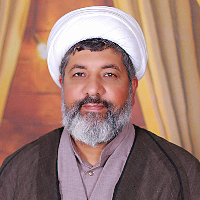مقالات رزومه:
دکتر محمود رمضانی کردآسیابی
-
کی از دغدغه های مهم اندیشه پردازان سیاست در عصر مدرن، تبیین رابطه و حدود نفوذ اصول اخلاقی در صحنه عمل سیاسی و اقناع حکمرانان به رعایت این اصول در تصمیم گیری های سیاسی است. این پژوهش درصدد است با روش تحلیل مضمون آیات قرآن و سنت معصومان، راهکارهای نهادینه شدن قواعد اخلاقی در سیاست بین الملل را کشف و ارائه نماید. یافته های تحقیق نشان می دهد در اسلام برای نهادینه کردن ارزش های اخلاقی از راهکارهای معرفتی، عاطفی و رفتاری استفاده شده است. دعوت به توحید، رسالت، معادباوری، آگاهی بخشی ملت ها ، تشویق به خردورزی، پرهیز از التقاط و پرهیز از شبهه پردازی، مهم ترین روش های معرفتی بوده، محبت و مهروزی، نرمش و خشونت بجا و کرامت انسانی، مهم ترین روش های عاطفی به شمار می روند و رفتار اخلاقی در جامعه، رفتارهای فرهنگی و اجتماعی و رفتارهای سیاسی، اقتصادی و نظامی ازجمله راهکار های رفتاری برای نهادینه سازی ارزش های اخلاقی در میان ملت های مسلمان و غیرمسلمان هستند. نتیجه مقاله مطرح می سازد ازنظر اسلام افزون بر لزوم همسویی اهداف سیاسی با اخلاق و ارزش های اخلاقی در روابط بین الملل، ابزار اجرای اهداف سیاسی نیز باید ارزشی و اخلاقی باشند.کلید واژگان: قرآن و سنت, اخلاق, سیاست, روابط بین الملل, اندیشه اسلامیOne of the important concerns of political thinkers in the modern era is to explain the relationship and limits of the influence of moral principles in the scene of political action and to persuade rulers to comply with these principles in political decisions. This research tries to discover and present solutions for the institutionalization of moral rules in international politics by analyzing the content of the Qur'anic verses and the traditions of the innocents. The findings of the research show that epistemic, emotional and behavioral solutions have been used in Islam to institutionalize moral values. Calling to monotheism, mission, monotheism, raising awareness among nations, encouraging rationality, avoiding eclecticism and avoiding suspicion are the most important methods of knowledge, love and compassion, gentleness and appropriate violence and human dignity are considered the most important emotional methods and moral behavior in Society, cultural and social behaviors and political, economic and military behaviors are among the behavioral solutions for institutionalizing moral values among Muslim and non-Muslim nations. The result of the article suggests that, from the point of view of Islam, in addition to the necessity of aligning political goals with ethics and moral values in international relations, the means of implementing political goals should also be valuable and moral.Keywords: Quran, Sunnah, Ethics, Politics, International Relations, Islamic Thought
-
هدف پژوهش حاضر بیان روش های معرفتی حکومت اسلامی در نهادینه سازی ارزش های اخلاقی در روابط بین الملل می باشد. این پژوهش درصدد است با روش توصیفی و تحلیلی دراین باره به این سوال اساسی پاسخ دهد که رروش های معرفتی حکومت اسلامی در نهادینه کردن ارزش های اخلاقی در روابط بین الملل کدم اند؟. راه کارهای معرفتی در یک تقسیم بندی به راه کارهای معرفتی نگرشی، گرایشی و واکنشی تقسیم می شوند. دعوت به توحید، رسالت و معاد از مهم ترین راه کارهای معرفتی نگرشی هستند که نقش اساسی و بنیادی در نهادینه کردن اخلاق در روابط بین الملل دارند و حکومت اسلامی ملزم است در تقویت این باورها تلاش نماید. آگاهی بخشی و دانش افزایی ملت ها، بیداری وجدان ملت ها، کاربست حکمت، ترویج فرهنگ عدالت خواهی، ترویج آسان و ساده آموزه های دینی در میان ملت ها از روش های معرفتی گرایشی. پرهیز از اکراه و اجبار مردم در درعوت به دین، نفی اصالت خشونت در روابط انسانی، مواجهه با بدعت گذاری و مواجهه با اندیشه های آسیب زا همانند؛ بدعت گذاری، التقاط و شبهه پردازی از روش های معرفتی واکنشی حکومت اسلامی در نهادینه سازی ارزش های اخلاقی در روابط بین الملل می باشند.کلید واژگان: ارزش های اخلاقی, حکومت اسلامی, روابط بین الملل, نهادینه سازی, قرآن, احادیثOne of the functions of an Islamic government is to institutionalize moral values in relations between Muslim and non-Muslim states and nations. Using a descriptive and analytical method, this research seeks to answer, a basic question in this regard: what are the epistemological solutions of the Islamic government in institutionalizing moral values in international relations? Strategies for institutionalizing ethical values in international relations are generally divided into practical (behavioral) and epistemological solutions. Epistemological solutions can be divided into attitudinal, tendentious and functional solutions. Towhid (Monotheism), Risalah, Imamate, and resurrection are among the most important epistemological-attitudinal solutions that play a fundamental role in institutionalizing ethics in international relations, and the religious government is obliged to work toward strengthening these beliefs. Increasing the knowledge and awareness of the people, promoting the culture of justice, endorsing religious teachings in the form of free acceptance, and seeking one’s rights are among the tendentious epistemological solutions, and confronting harmful ideas such as heresy, eclecticism, and skepticism are among the functional epistemological solutions of the Islamic government in institutionalizing ethics in international relations.Keywords: Moral Values, International Relations, Institutionalization, Quran, Hadith
نویسندگان همکار
بدانید!
- این فهرست شامل مطالبی از ایشان است که در سایت مگیران نمایه شده و توسط نویسنده تایید شدهاست.
- مگیران تنها مقالات مجلات ایرانی عضو خود را نمایه میکند. بدیهی است مقالات منتشر شده نگارنده/پژوهشگر در مجلات خارجی، همایشها و مجلاتی که با مگیران همکاری ندارند در این فهرست نیامدهاست.
- اسامی نویسندگان همکار در صورت عضویت در مگیران و تایید مقالات نمایش داده می شود.



